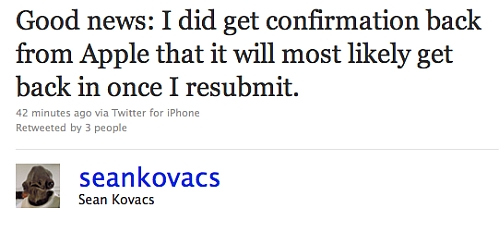It has been over a year since iPhone users were legitimately allowed to make calls and text messages through the Google Voice application on their smartphones before Apple's curated App Store supervisors unceremoniously removed the app without explanation on July 28, 2009. Shortly afterwards, the Federal Communications Commission began an active investigation into Apple's rejection of Google Voice, presuming that the takedown was caused in part by internal contract agreements that had been prearranged with AT&T, the exclusive iPhone provider in the United States.
With a fear of losing customers to a third-party iPhone data application provided by Google, many speculated that AT&T was actively engaged in protecting its monopolistic control over the iPhone by ensuring that the application would not be available in Apple's marketplace. After all, the fruit-themed toymaker had remained mute on the issue after being interrogated by multiple news outlets, and AT&T President of Emerging Devices and Resale Glenn Lurie had even attempted to remove the company from the issue entirely by noting that "AT&T does not manage the App Store – and [AT&T] is not involved in the approval process for apps in the App Store."

On Thursday, September 9, 2010, Apple released explicit guidelines [PDF] that, for the first time in history, have detailed what applications it will accept and reject from the App Store. From the App Store Review Guidelines:
Around April 2010, a number of new paragraphs in the iPhone SDK License prohibited the use of outside application developments that provided "an intermediary translation or compatibility layer or tool," including systems that ported Adobe Flash Player, Microsoft Silverlight, Java, and other platforms to the iPhone. According to the new rules, "applications may only use Documented APIs in the manner prescribed by Apple and must not use or call any private APIs. Applications must be originally written in Objective-C, C, C++ or JavaScript as executed by the iPhone OS WebKit engine, and only code written in C, C++, and Objective-C may compile and directly link against the Documented APIs."
As it turns out, Apple has ultimately decided to relax its stringent developer requirements as of yesterday in its new App Store Review Guidelines, providing developers with more transparency about the review process and removing arbitrary and inconsistent factors associated with approvals and rejections. In lieu of this transparency, GV Mobile application developer Sean Kovacs read through each of Apple's new 100+ rules, and concluded that his application didn't seem to violate any of them. Representatives from TechCrunch reached out to Kovacs regarding his perspective, and he responded that given the new review guidelines, he was welcome by Apple to resubmit GV Mobile for review.

In addition, corporate representatives at Google have been contacted by a variety of reporters regarding the situation. The official statement from the company reads, "we currently offer Google Voice mobile apps for Blackberry and Android, and we offer an HTML5 web app for the iPhone. We have nothing further to announce at this time." With a statement showing no signs of any official Google Voice application development for the iPhone, it appears that Google doesn't want to cross into boundary limits shared by Apple and AT&T exclusivity negotiations, and will continue provide a web-based alternative that can be freely accessed at any time without any contractual restrictions.
Within a few days, millions of iPhone consumers will know whether or not GV Mobile has been reapproved for App Store distribution, and there is speculation arising that AT&T may respond with some publicity stunt to urge its customers to stay away from the app. Nevertheless, we look forward to the next step in the process and hope the consumers win in the long run.





